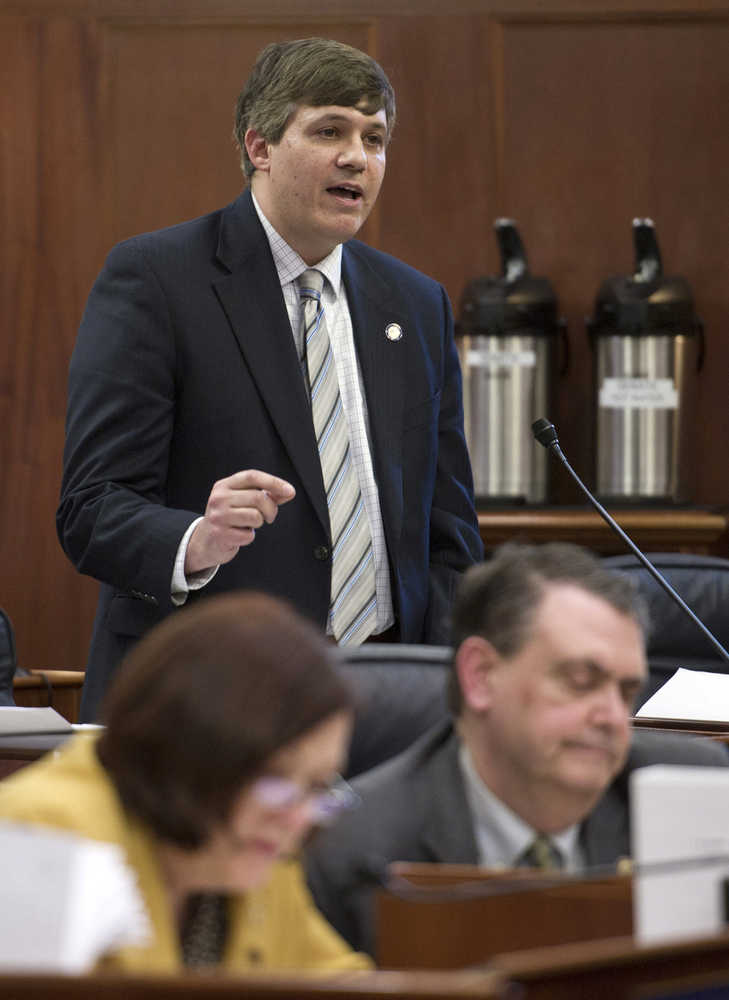The Alaska Senate voted 16-4 on Monday to approve an $8.73 billion state operations budget that includes $571 million in cuts and sets up the full Legislature to begin a debate on taxes.
The Senate’s budget will be combined with an $8.66 billion version the House passed last week. A final, compromise version of the budget is not expected until the end of the Legislative session, after lawmakers have figured out how to pay for it.
With the state considering a $3.7 billion deficit due to low oil prices, the next question is whether to cover the deficit with savings from the $8.2 billion Constitutional Budget Reserve or to come up with additional revenue from taxes or the earnings of the Alaska Permanent Fund.
As in the House, the Democratic-led minority on Monday attempted to amend the budget to address what it saw as problems with the bill drafted by the Republican-led majority. As in the House, all the amendments were resoundingly defeated.
“This budget still leaves unscathed hundreds of millions of dollars in corporate welfare,” said Sen. Bill Wielechowski, D-Anchorage. “These are tough financial times for Alaska, but when the boat takes on water, you shouldn’t be throwing overboard foster kids.”
Sen. Pete Kelly, R-Fairbanks and co-chairman of the Senate Finance Committee, said the thinner budget means the “people of Alaska are somewhat assured we’re somewhat committed to cutting the budget” before approving taxes or spending from the earnings of the Permanent Fund.
He also said the Senate is passing its version of the budget early, so it has time to consider revenue. “We’ve never even been close to operating on this timeline,” he said.
The House and Senate budgets are similar in amount, but they differ under the hood. Speaking in the Senate Finance Committee last week, Kelly said the Senate decided to forego some budgeting strategies used by the House.
To reduce the amount of money the Legislature needs to find this year, the House plans to roll money left over from last year into a handful of state trust funds, then use those trust funds to pay for some operations. That plan, which includes $288 million in “found” money left in the Statutory Budget Reserve, was decried as a “shell game” by a pair of House lawmakers, and the Senate decided against the House’s approach.
“It has been our intent to make the budgeting as simple or transparent as possible,” Kelly said.
Instead, the Senate plan calls for spending about $342 million to pay down the state’s debt to the Teachers Retirement System and the Public Employee Retirement System.
That will save between $16 million and $20 million per year in debt service payments, Kelly said.
The Senate budget also provides more funding to the Alaska Seafood Marketing Institute and state tourism marketing than the House version does. The Senate budget provides more money for pre-kindergarten programs, and it does not fund a $30 million grant program for substance abuse treatment and prevention that was included in the House.
The House version of the budget includes millions in inflation-proofing for the Alaska Permanent Fund; the Senate version does not. The House version makes steeper cuts to the University of Alaska; the Senate version includes $100 million in undesignated cuts. According to a legal memo provided to Sen. Dennis Egan, D-Juneau, those undesignated cuts could be unconstitutional.
The Senate budget could have included significant cuts to the state’s big-ticket construction projects, but each of the Senate minority’s amendments in that regard were defeated.
The minority repeatedly suggested the state should divert previously authorized money for the Ambler Road, Knik Arm bridge, Susitna-Watana dam, and other construction projects to things like community revenue sharing, grants for seniors, and public broadcasting.
Each time, the majority said no.
The closest vote came when Egan proposed diverting money from an Anchorage road project to the Alaska Marine Highway and state revenue sharing, which sends money to hundreds of towns and cities across the state.
“The marine highway system is not a choice or convenience … it’s vital for our region’s commerce and transportation,” Egan said.
Egan’s amendment was defeated 6-13, with the minority joined by Sen. Gary Stevens, R-Kodiak, and Sen. Bert Stedman, R-Sitka. Sen. Donald Olson, D-Golovin, walked out of the room for the vote.
At the end of the floor session, Egan was one of the four votes against the full budget.
“I just really am deeply disappointed in what they did to the marine highway system,” he said. “The ferry system has taken a disproportionate cut, and I really think they ought to be fairer.”
• Contact reporter James Brooks at james.k.brooks@juneauempire.com.

